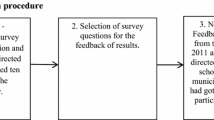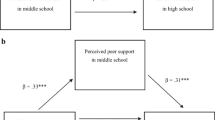Abstract
This longitudinal study set out to examine the changes that took place in parents’ evaluations of their child’s school in the course of the child’s complete 9-year-long compulsory education. Over the follow-up period, academically educated and vocationally educated mothers and fathers (N = 326) were asked to indicate their degree of satisfaction with aspects of their child’s school every 2 years. It was found that the level of parental satisfaction was fairly high at the start, that the general decreasing trend was gradual rather than abrupt, and that the proportion of dissatisfied parents remained low and stable. A pattern of differences emerged to suggest that the parents’ perceptions were structured by their social-psychological distance from the school as measured by their social positions; for instance, the vocationally educated parents, fathers in particular, displayed less satisfaction than the academically educated ones.
Résumé
Cette étude longitudinale se propose d’examiner, au long du cycle scolaire obligatoire de neuf ans, comment l’évaluation faite par les parents de l’école de leur enfant change. Au cours de la période observée, il a été demandé à des pères et mères (N = 326), ayant suivi une formation générale ou professionnelle, d’indiquer leur degré de satisfaction quant à certains aspects de l’école de leur enfant et ceci tous les deux ans. Il a été remarqué qu’au début du cycle le degré de satisfaction était assez élevé, que l’affaiblissement de la tendance générale était graduel et non brusque, et que la proportion de parents insatisfaits restait basse et stable. Un type de différences est alors apparu qui suggère que la distance psycho-sociale des parents par rapport à l’école, celle-ci étant directement liée à leurs positions sociales, structure leur perception. Par exemple, les parents ayant suivi une formation professionnelle, les pères en particulier, ne montrent pas une aussi grande satisfaction que les parents ayant suivi une formation générale.
Similar content being viewed by others
References
Ahola, S., & Nurmi, J. (1997). Choosing university or vacational college—the formation of educational preferences. Scandinavian Journal of Educational Research, 41, 127–138.
Antikainen, A. (2006). In search of the Nordic model in education. Scandinavian Journal of Educational Research, 50, 229–243.
Balboni, G., & Pedrabissi, L. (1998). School adjustment and academic achievement: parental expectations and socio-cultural background. Early Child Development and Care, 143, 79–93.
Bourdieu, P., & Passeron, J. (1977). Reproduction in education, society and culture. London: Sage.
Doise, W. (1986). Levels of explanation in social psychology. Cambridge: Cambridge University Press.
Education at a Glance. (2003). OECD Indicators 2003. Paris: OECD Publications.
Fredricks, J., & Eccles, J. (2002). Children’s competence and value beliefs from childhood through adolescence: growth trajectories in two male-sex-typed domains. Developmental Psychology, 38, 519–533.
Gordon, T., Holland, J., & Lahelma, T. (2000). Making spaces: citizenship and difference in schools. New York: Macmillan.
Grozier, G. (1999). Is it a case of ‘we know when we’re not wanted’? The parents’ perspective on parent-teacher roles and relationships. Educational Research, 41, 315–328.
Hughes, M., Wikeley, F., & Nash, T. (1994). Parents and their children’s schools. Oxford: Blackwell.
Jauhiainen, A., & Alho-Malmelin, M. (2004). Education as a religion in the learning society. International Journal of Lifelong Education, 23, 459–474.
Kasanen, K., & Räty, H. (2008). “Do the very best you can—third-grade class test. Social Psychology of Education, 11, 193–208.
Kerstin-Baeck, U.-D. (2005). School as an arena for activating cultural capital. Nordisk Pedagogic, 25, 217–228.
Kuusinen, J. (1992). Hyvät, huonot ja keskinkertaiset [The bright, the poor and the mediocre pupils]. Kasvatus [Finnish Journal of Education], 23, 192–197.
Lahelma, E., & Gordon, T. (1997). Learning to be a ‘professional pupil’. Educational Research and Evaluation, 3, 119–139.
Lareau, A. (1987). Social class differences in family-school relationship: the importance of cultural capital. Sociology of Education, 60, 73–85.
Lareau, A. (2003). Unequal childhood: class, race, and family life. Berkeley: University of California Press.
Lewis, C., & Lamb, M. (2003). Fathers’ influences on children’s development: the evidence from two-parent families. European Journal of Psychology of Education, 18, 211–228.
Linnakylä, P. (1996). Quality of school life in the Finnish comprehensive school. A comparative view. Scandinavian Journal of Educational Research, 40, 69–85.
Meadmore, D. (1993). The production of individuality through examination. British Journal of Sociology of Education, 14, 59–73.
Metso, T. (2004). Koti, koulu ja kasvatus – kohtaamisia ja rajankäyntejä [Home, school, and education]. Research in Educational Science 19. Helsinki: The Finnish Educational Society.
Skolbarometer, N. (2001). Attityder till skolan år 2000. Copenhagen: Nordisk Ministerrådet.
PISA. (2005). Learning for tomorrow’s world—first results from PISA 2003. Paris: OECD Publications.
Power, S. (2006). Markets and misogyny: educational research on educational choice. British Journal of Educational Studies, 54, 175–188.
Räty, H. (2003a). The significance of parents’ evaluations of their own school for their educational attitudes. Social Psychology of Education, 6, 43–60.
Räty, H. (2003b). At the threshold of school—parental assessments of the competencies of their preschool-aged children. Journal of Applied Social Psychology, 33, 1862–1877.
Räty, H. (2006). What comes after compulsory education? A follow-up study on parental expectations of their child’s future education. Educational Studies, 32, 1–16.
Räty, H. (2007). Parents’ own school recollections influence their perception of the functioning of their child’s school. European Journal of Psychology of Education, 23, 389–400.
Räty, H., & Kasanen, K. (2010). A seven-year follow-up study on parents’ expectations of their child’s further education. Journal of Applied Social Psychology (in press).
Räty, H., & Snellman, L. (1998). Social representations of educability. Social Psychology of Education, 1, 359–367.
Räty, H., Snellman, L., Mäntysaari-Hetekorpi, H., & Vornanen, A. (1996). Parents’ views on the comprehensive school and its development: a Finnish study. Scandinavian Journal of Educational Research, 40, 203–215.
Räty, H., Snellman, L., & Vainikainen, A. (1999). Parents’ assessments of their children’s abilities. European Journal of Psychology of Education, 14, 423–437.
Räty, H., Jaukka, P., & Kasanen, K. (2004). Parents’ satisfaction with their child’s first year of school. Social Psychology of Education, 7, 463–479.
Räty, H., Sivonen, H., & Kasanen, K. (2005). Lapsen kolme ensimmäistä kouluvuotta – seuranta vanhempien tyytyväisyydestä sekä myönteisinä ja kielteisinä muistamista asioista [The child’s first three years of school]. Kasvatus [Finnish Journal of Education], 36, 113–125.
Räty, H., Kasanen, K., & Honkalampi, K. (2006). Three years later: a follow-up study of parents’ assessments of their children’s competencies. Journal of Applied Social Psychology, 36, 2079–2099.
Räty, H., Kasanen, K., & Laine, N. (2009). Parental participation in their child’s schooling. Scandinavian Journal of Educational Research, 53, 277–293.
Räty, H., Komulainen, K., & Korhonen, M. (2010). Menestystä, kilpailua, tasa-arvoa. Vanhempien koulun yrittäjyyskasvatusta koskevat sosiaaliset tulkinnat [Success, competition, equality. Parental representations of the school’s entrepreneurial education]. In K. Komulainen (Ed.), Yrittäjyyttä kaikille? [Entrepreneurship for everyone?]. Tampere: Vastapaino.
Realy, D. (1998). Re-thinking social class: qualitative perspectives on gender and social class. Sociology, 32, 259–275.
Rose, L., & Gallup, A. (2002). The 34th annual Gallup poll of public attitudes toward the public schools. Phi Delta Kappan, 84, 41–56.
Seppänen, P. (2006). Kouluvalintapolitiikka perusopetuksessa – suomalaiskaupunkien koulumarkkinat kansainvälisesä valossa [School choice policy in comprehensive schooling – school markets of Finnish cities in the international perspective]. Turku: Research in Educational Sciences 26.
Simola, H., Rinne, R., & Kivirauma, J. (2002). Abdication of the education state or just shifting responsibilities? The appearance of a new system of reason in construction educational governance and social exclusion/inclusion in Finland. Scandinavian Journal of Educational Research, 46, 247–264.
Author information
Authors and Affiliations
Corresponding author
Additional information
Hannu Räty. Department of Education and Psychology, University of Eastern Finland, P.O. Box 111, 80101 Joensuu, Finland. E-mail: hannu.raty@uef.fi
Current themes of research:
Children’s schooling from parental perspective. Social representations of intelligence. Conceptions of the malleability of academic competencies. School memories. Educational reform. Children’s images of intelligence in cross-cultural comparison.
Most relevant publications in the field of Psychology of Education:
Räty, H. (2007). Parents’ own school recollections influence their perception of the functioning of their child’s school. European Journal of Psychology of Education, XXII, 389–400.
Räty, H., & Kasanen, K. (2007). Gendered views of ability in parents’ perception of their child’s academic competencies. Sex Roles, 56, 117–124.
Kasanen, K., & Räty, H. (2008). Do the very best you can—Third-grade class test. Social Psychology of Education, 11, 193–208.
Kärkkäinen, R., Räty, H., & Kasanen, K. (2008). Children’s notions of the malleability of their academic abilities. Social Psychology of Education, 11, 445–458.
Räty, H., Kasanen, K., & Laine, N. (2009). Parental participation in their child’s schooling. Scandinavian Journal of Educational Research, 53, 277–293.
The study was supported by the Academy of Finland.
Rights and permissions
About this article
Cite this article
Räty, H. School’s out: a comprehensive follow-up study on parents’ perceptions of their child’s school. Eur J Psychol Educ 25, 493–506 (2010). https://doi.org/10.1007/s10212-010-0028-3
Received:
Revised:
Published:
Issue Date:
DOI: https://doi.org/10.1007/s10212-010-0028-3




